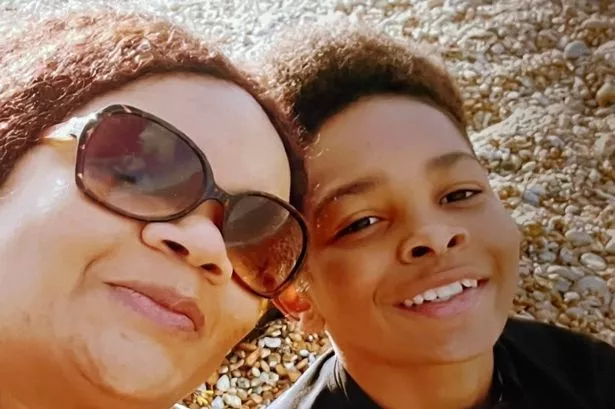The tragic death of 14-year-old Kelyan Bokassa, fatally stabbed on a London bus, has plunged his family into unimaginable grief. His mother, Mary Bokassa, 50, shared her heart-wrenching story with The Mirror, painting a vivid picture of a loving, ambitious boy whose life was cruelly cut short. Kelyan, described as a bright and talented student with dreams of becoming an engineer, was on his way home from school, riding the 472 bus in Woolwich, South East London, when the senseless attack occurred. The incident, which unfolded on a seemingly ordinary Tuesday afternoon, has left the community reeling and ignited a wave of anger and sorrow. Mary’s account reveals the devastating impact of knife crime, not just on the immediate victim, but on the entire family and wider community left to grapple with the aftermath of such violence.
Mary spoke of Kelyan’s vibrant personality, his passion for football, and his dedication to his studies. He was a beloved son, brother, and friend, known for his infectious smile and kind heart. He dreamt of a future filled with promise, a future that was snatched away in a single, brutal act. Mary described the agonizing moment she received the news of Kelyan’s stabbing, the frantic rush to the hospital, and the devastating realization that her son was gone. Her words conveyed the raw pain of a mother robbed of her child, the unimaginable void left by his absence, and the burning questions that haunt her – why Kelyan? why this bus? why such senseless violence? Her grief is a stark reminder of the human cost of knife crime, a cost that extends far beyond the headlines and statistics.
The incident has sparked widespread outrage and calls for action to address the escalating issue of knife crime, particularly among young people. Community leaders, politicians, and anti-violence advocates have voiced their concerns, emphasizing the urgent need for comprehensive strategies to prevent such tragedies. Mary’s plea for justice for her son echoes the sentiments of many who believe that more needs to be done to protect young lives and create safer communities. The incident underscores the complex societal factors contributing to youth violence, including poverty, lack of opportunity, and the normalization of carrying weapons. It also highlights the crucial role of education, mentorship, and community support in diverting young people away from violence.
The investigation into Kelyan’s death is ongoing, with authorities working tirelessly to bring those responsible to justice. The incident has prompted increased police presence in the area and renewed efforts to tackle knife crime through targeted interventions and community engagement. While the legal process unfolds, Mary and her family are left to navigate the immense grief and trauma of losing Kelyan. They are surrounded by a community in mourning, grappling with the senseless loss of a young life full of potential. The incident serves as a tragic reminder of the devastating consequences of knife crime and the urgent need for collective action to prevent future tragedies.
Kelyan’s story is not an isolated incident. It reflects a broader societal problem that demands a multi-faceted approach. Solutions require not only law enforcement efforts but also investment in social programs that address the root causes of violence. This includes providing young people with access to education, mentorship, and positive role models, as well as creating safe spaces and opportunities for them to thrive. It also means challenging the culture of violence and promoting peaceful conflict resolution. The focus should be on early intervention and prevention, working with families and communities to create environments where young people feel safe, valued, and empowered to make positive choices.
The outpouring of grief and support following Kelyan’s death demonstrates the profound impact of this tragedy on the community. It serves as a call to action, a reminder that we must all play a role in creating a society where young lives are valued and protected. Mary’s bravery in sharing her story has brought the devastating reality of knife crime into sharp focus, amplifying the urgent need for change. As the community mourns the loss of Kelyan, his memory serves as a powerful symbol of the fight against knife violence and the ongoing struggle to build a safer future for all young people. The hope is that Kelyan’s legacy will inspire meaningful action and lasting change, preventing other families from experiencing the same unimaginable pain.














